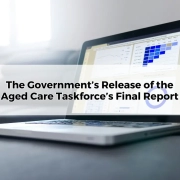The Role of Financial Advisers in Aged Care Planning
Table of Contents
ToggleAged care planning is an essential process that ensures individuals receive appropriate care and financial stability in later life. Without adequate planning, individuals and their families may face significant financial burdens and unexpected costs, leading to stress and uncertainty. By engaging in structured aged care planning, individuals can make informed decisions about their future, safeguarding both their well-being and financial security.
The Complexities of Aged Care Funding in Australia
The Australian aged care system is multifaceted, with various funding mechanisms, government subsidies, and private payment options. Understanding these complexities requires expertise, as regulations and entitlements change frequently. Aged care financial advisers provide clarity on the available funding sources, helping individuals navigate the financial landscape to optimise their care arrangements.
Government Support and Subsidies for Aged Care
The Australian Government provides financial assistance for aged care through programs such as the Aged Care Pension, Home Care Packages, and Residential Aged Care Subsidies. While these subsidies can reduce costs significantly, eligibility criteria and means testing apply. Financial advisers guide individuals through these requirements, ensuring they access the maximum available benefits while maintaining financial sustainability.
The Role of a Financial Adviser in Aged Care Planning
A financial adviser specialising in aged care planning offers tailored advice on funding strategies, asset structuring, and government entitlements. They assess personal financial situations and provide recommendations that align with an individual’s goals and preferences. Their expertise ensures a seamless transition into aged care while preserving wealth and minimising unnecessary expenses.
Structuring Assets to Optimise Aged Care Costs
Proper asset structuring is crucial for minimising aged care costs. The treatment of assets and income impacts means-tested care fees and pension entitlements. Financial advisers assist in strategically organising assets to ensure clients remain eligible for government support while maintaining financial independence.
Understanding Means Testing and Its Impact on Fees
Means testing determines the level of contribution an individual must make towards their aged care costs. This assessment considers both income and assets, influencing fees for home and residential aged care. Professional financial advice helps individuals structure their finances to manage their means-tested fees effectively and avoid excessive costs.
Managing the Family Home in Aged Care Planning
The family home is often a significant consideration in aged care financial planning. Whether to retain, sell, or rent the property can have financial and emotional implications. Aged care financial advisers evaluate the best course of action based on a client’s circumstances, ensuring the decision aligns with long-term financial goals.
Strategies for Funding Aged Care Services
Aged care costs can be funded through various sources, including superannuation, investments, and home equity. Selecting the most effective funding strategy requires careful analysis to ensure financial sustainability. Aged care financial advisers assist in evaluating these options, tailoring solutions to meet individual needs while maintaining financial security.
Superannuation and Retirement Planning for Aged Care
Superannuation plays a vital role in funding aged care expenses. Proper planning ensures that retirement savings are allocated efficiently to cover care costs without depleting resources prematurely. Financial advisers provide strategies to optimise superannuation drawdowns while maintaining eligibility for government benefits.
Estate Planning and Aged Care
Estate planning is integral to aged care financial planning, ensuring assets are distributed according to an individual’s wishes. Wills, powers of attorney, and advance care directives must be carefully structured to avoid legal complications and ensure a seamless transfer of assets. Aged care financial advisers collaborate with legal professionals to align estate plans with overall financial strategies.
Avoiding Common Pitfalls in Aged Care Financial Planning
Many individuals make costly mistakes in aged care financial planning due to misinformation or lack of guidance. Errors such as poor asset structuring, overlooking entitlements, or mismanaging cash flow can lead to financial hardship. Engaging an experienced financial adviser mitigates these risks, ensuring a well-informed and strategic approach.
Choosing the Right Financial Adviser for Aged Care Planning
Selecting a qualified financial adviser with expertise in aged care planning is essential. Key considerations include credentials, experience, and a thorough understanding of aged care regulations. A trusted adviser provides not only financial expertise but also peace of mind in navigating the complexities of aged care.
The Benefits of Professional Financial Advice in Aged Care Planning
Engaging a financial adviser offers significant advantages, including cost savings, improved financial security, and optimised care arrangements. With expert guidance, individuals can make informed decisions that protect their financial well-being while ensuring access to high-quality aged care services. Proactive planning with professional advice delivers long-term benefits, ensuring individuals receive the care they deserve without financial strain.









